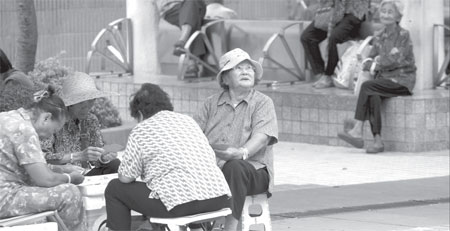Elders to enjoy HK$2 transit fees
Updated: 2011-10-13 09:56
By Guo Jiaxue(HK Edition)
|
|||||||||
|
Senior citizens play cards for leisure in Hong Kong. More than 1 million elderly people will benefit from the new policies announced by the CE on Wednesday. Provided to China Daily |
Guangdong scheme to ease burden on cross-border elderly
A large package of measures will be introduced to ease the burdens on the elderly, Chief Executive Donald Tsang proposed on Wednesday, as he addressed one of the city's most pressing concerns.
While the lengthiest part of Tsang's address dealt with housing, elder care came next in terms of time devoted to addressing the issue.
One of the most widely applauded measures was his plan to reduce the transportation burden on the elderly. The Chief Executive proposed that every person over 65 be permitted to travel on general MTR lines, franchised buses and ferries, any time of day for HK$2 a trip.
That means a direct government subsidy on traffic costs, in addition to various existing fare concessions offered voluntarily by public transport operators. The government will periodically reimburse the operators on an accounting basis.
Likely to be exempted from the concession are first-class MTR seats, rides on the Airport Express, trips to Lo Wu and Lok Ma Chau station, outlying islands ferries, a government source said. The elderly may start enjoying the HK$2 fare during the second half of next year at the earliest.
Nelson Chow Wing-sun, chair professor of social work and social administration at the University of Hong Kong, said the measure will have a "very big impact". More than 1 million elderly people in Hong Kong will benefit.
The measure will change the elders' lifestyle and extend their social circle - they will be able to meet with their friends and families living in other districts much more often, Chow said.
Besides, spending less money on travel means other expenditures may be increased, he added, citing healthcare as one example.
In his final policy address Tsang also well responded to the voices calling for canceling the limit on absences from Hong Kong for receiving the Old Age Allowance (OAA) for Hong Kong elderly people who choose to reside on the mainland.
He proposed the "Guangdong Scheme", allowing eligible elderly people living in Guangdong to receive a full-year's allowance without the condition of having to reside in Hong Kong for at least 60 days a year.
Recipients will be able to receive the money without having to return to Hong Kong. A government source said the new scheme will particularly help those who have already lived in Guangdong for years to skip certain eligibility criteria to apply for the allowance.
Due to the complex nature of the scheme, the new arrangement cannot be realized until the second half of 2013 at earliest, the government source said.
The source added it's hard to estimate the number of people who will benefit but he emphasized there is no cap on the number of recipients.
Chow believes there are about 70,000 elderly Hong Kong people currently living in Guangdong. He said the new scheme is "a good thing" for them.
Federation of Trade Unions Vice Chairman, Wong Kwok-kin also applauded the scheme, saying it brings the "flush of dawn" to Hong Kong elders on the mainland.
According to the statistics released by the Census and Statistic Department, there were 115,500 Hong Kong people, aged over 60, living on the mainland, as at last February.
The chief executive also indicated the necessity of reversing the current unbalanced resource allocation in community care and residential care services.
He proposed directly to subsidize the elderly to use community care services by vouchers. The government source indicated the represents a big change of the funding model, from financing service operators to subsiding elders and letting them choose services. That will introduce competition among operators, and finally improve community care services, the source said.
A four-year pilot scheme will be launched, starting with those elderly people who need long-term moderate care. The Social Welfare Department has yet to determine the value of the vouchers.
Mak Hon-kai, president of the Hong Kong Association of Senior Citizens, questioned whether the plan is realistic since there may be insufficient manpower to carry it out.
At the same time Tsang stressed that the need for residential care services will not be met.
He proposed to grant a monthly supplement of HK$250 for Comprehensive Social Security Assistance recipients aged 60 or above and living in non-subsidized homes, to ease their burden.
The government will introduce a public swimming pool monthly ticket scheme to lighten the burden on elderly recreational swimmers.
Additional funds will also be allocated to enhance public healthcare services such as cataract removal, haemodialysis, joint replacement, and mental health services.
But Tsang said a universal retirement protection scheme, would not be feasible, saying middle class and professionals would generally not accept it now.
Mak voiced disappointment about that. He said the government failed to foresee the risks of not having a fully-developed retirement protection.
Chief Executive of the Hong Kong Council of Social Service Christine Fang also expressed dissatisfaction that Tsang rejected the idea without any public consultation. Fong criticized the government for disregarding the need of elderly poor and aging grassroots.
guojiaxue@chinadailyhk.com
China Daily
(HK Edition 10/13/2011 page2)
